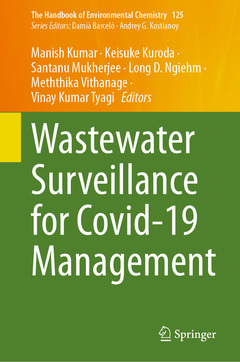Wastewater Surveillance for Covid-19 Management, 1st ed. 2024 The Handbook of Environmental Chemistry Series, Vol. 125
Coordonnateurs : Kumar Manish, Kuroda Keisuke, Mukherjee Santanu, Ngiehm Long D., Vithanage Meththika, Tyagi Vinay Kumar

This book reviews the recent challenges and future perspectives involved in the wastewater-based epidemiology (WBE) for COVID-19. The book aims to improve the monitoring of COVID-19 in wastewater by focusing on recent scientific studies in the surveillance and treatment of wastewater containing SARS-CoV-RNA, assessment of COVID-19 in the community and delivering a new scientific understanding of prevalence and re-emergence based on the WBE. It also provides a global perspective on effective detection methods for the analysis and interpretation of the RNA count of SARS-CoV-2 virus in wastewater and predicts the effects wastewater may have on the infection rate.
Readers will find in this book case studies from France, India and Southeast Asian of non-invasive population-based monitoring of SARS-CoV-2 through sewage surveillance, and will learn more about the virus behaviour and transmission in different environmental settings. The significance of membrane technologies for virus removal from water is also addressed in this book, as well as advanced techniques for identifying, quantifying, and characterizing SARS-CoV-2 in activated sludge and wastewater.
The book provides a great interface to researchers such as microbiologists, environmental engineers, data scientists and civil engineers, emphasizing issues related to the current monitoring methodology. Furthermore, it also encourages researchers and policymakers by raising awareness of potential new methodologies for wastewater surveillance and accurate monitoring of COVID-19.
Chapter 2 Geospatial Mapping of COVID-19 Cases in Kerala Using Clinical Data: A Case Study from South India for Policy Advocacy
Chapter 3 Virus Separation by Membrane Technology
Chapter 4 Toward Reliable Detection and Quantification of SARS-CoV-2 in Wastewater and Environmental Water
Chapter 5 Broadening Wastewater Monitoring of SARS-CoV-2 RNAChapter 6 WBE: An Integral Part of Mass Surveillance of COVID-19?
Chapter 7 Implementation of a National Wastewater Surveillance System in France as a Tool to Support Public Authorities During the Covid Crisis: The Obepine Project
Chapter 8 Covid-19: Survival and Transmission in Wastewater and Sludge
Chapter 9 COVID-19: An Insight into Social Dimension
Chapter 10 Double Trouble: COVID-19 and MicroplasticsChapter 11 Impact of COVID-19-Induced Lockdown on Air Quality of Major Cities of Uttar Pradesh, India
Chapter 12 Comprehensive Review of COVID-19: Impacts, Comorbidity, and Management
Chapter 13 Prediction in the Context of Viral Pandemics: A Special Emphasis on SARS-CoV-2
Chapter 14 Environmental Monitoring for Pandemic Restriction and Proper Regulation in the Post-COVID Era
Chapter 15 Antimicrobial Resistance Ignited by COVID-19 Pandemic: SOS for Antimicrobial StewardshipChapter 16 Crucial Effects of COVID-19 on Antimicrobial Resistance
Chapter 17 COVID-19 Management in the Northeastern India
Dr. Manish Kumar is a Distinguished Professor at the School of Engineering and Sciences, Tecnologico de Monterrey, Mexico; & at UPES, Dehradun, India. He also serves as an Institute Professor (Visiting) at Chuo University, Japan. Previously, he served IIT Gandhinagar (India), & Tezpur University (India). He also worked at University of Nebraska Lincoln, US; Kunsan University, South Korea; Uppsala University, Sweden. His research aims to broaden the understanding of fate, transport, and remediation of geogenic, microbial and emerging contaminants.
Prof. Kumar earned Ph.D. from the University of Tokyo, Japan, and supervised ten Ph.D. thesis and >50 master dissertations, contributed >200 international journal articles, cited >10,000 times, leading to a H-index >50 and i-10>175. He featured in the list of the top 2% of researchers in the world (2019–2023). He is Fellow of the Royal Society of Chemistry (FRSC). He renders editorial services to several Q-1 journals of the American Chemical Society, Elsevier, & Springer.
Dr. Keisuke Kuroda is an Associate Professor at the Department of Environmental and Civil Engineering, Toyama Prefectural University, Japan. He received his Ph.D. in Engineering from the University of Tokyo (2010). He was a postdoctoral research fellow at Eawag, Switzerland, and the University of Tokyo, and was a senior scientist at National Institute for Environmental Studies (NIES), Japan. His research interests lie in the dynamics of various natural and man-made pollutants in the water environments and their management in urban water systems. Particular interests are subsurface geochemistry and mitigation technologies of contaminants of emerging concern (CECs), such as pharmaceuticals and personal care products (PPCPs), arsenic, and per- and polyfluorinated substances (PFAS). Recent research focuses include assessment of environmental fate of antiviral drugs and their ecotoxicological risks
Outlines the wastewater-based epidemiology for SARS-CoV-2
Builds a road map for robust detection methodologies
Provides an overview on wastewater survelliance of Covid-19
Date de parution : 04-2024
Ouvrage de 374 p.
15.5x23.5 cm
